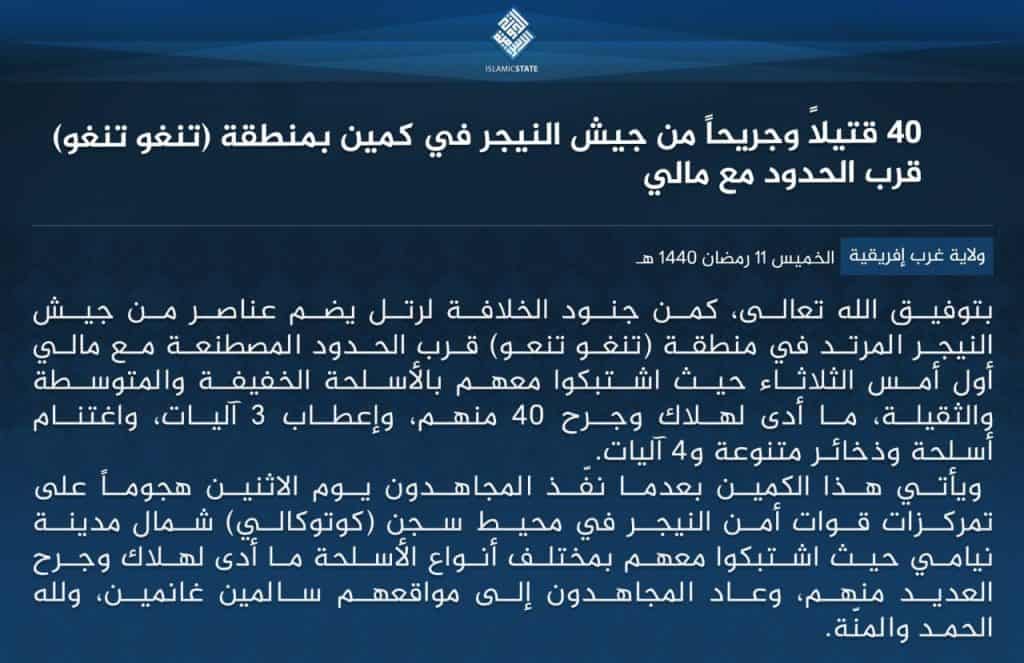
The Islamic State has claimed responsibility for a deadly ambush on Tuesday in the Tongo Tongo area of Niger near the borders with Mali. At least 28 Nigerien soldiers were killed in the attack, which is one of the deadliest to have happened in recent years.
“Thanks to God, soldiers of the Caliphate ambushed a column of the apostate Nigerien army in the Tongo Tongo area near the artificial borders with Mali,” the Islamic State’s claim begins.
The statement continues by saying that “an armed clash resulted in the death and wounded of 40 among them, damaging three vehicles, and capturing weapons, various ammunition, and four vehicles.”
According to Nigerien officials, troops were pursuing militants who attacked an important prison outside the capital of Niamey late on Monday. The Islamic State’s claim also makes clear that its men were also responsible for the assault on the prison.
The jihadist group claims that several Nigerian soldiers were killed at the prison, however, Niger’s Ministry of Interior reported that only one soldier was killed in the assault.
Near the area of Tongo Tongo, the now infamous region where four US Special Forces soldiers were killed in 2017, the pursuing soldiers were then ambushed by another set of fighters following an IED detonation on a military vehicle.
French media has reported that the jihadists demonstrated a high degree of sophistication in the ambush. Radio antennas and phone relays were reportedly destroyed prior to the attack, making it difficult for the Nigerien forces to communicate.
The initial death toll of the ambush stood at 17 Nigerien soldiers killed in the ambush, while another 11 soldiers were reported missing. After a joint search operation involving Nigerien, French, and American forces, the bodies of the missing were eventually recovered bringing the total number of deaths to 28.
Much like previous Islamic State claims in the Sahel, today’s statement was released under the group’s West Africa Province moniker. Hierarchical questions remain as to where the group commonly known as the Islamic State in the Greater Sahara, which has been responsible for attacks in the Sahel, fits under the Islamic State’s structure.
The ambush in Niger comes on the heels of several high-profile attacks and incidents in the Sahel in recent weeks. Last week, for instance, French forces freed four hostages, including French, South Korean, and American nationals, in Burkina Faso. While all hostages were safely rescued, two French soldiers were killed in the raid.
While the captors are still unknown, French authorties have confirmed that the American hostage was due to be transferred to al Qaeda’s Katibat Macina, which is a constituent group of the Group for Support of Islam and Muslims (JNIM), in Mali.
Elsewhere in Burkina Faso, several Catholic churches have been attacked in recent days. Last Sunday, six people, including a priest, were killed when gunmen stormed a mass service in the town of Dablo. On Monday, another four people were killed after an assault on a church near the town of Kongoussi.
Security in the Sahel has rapidly deteriorated in recent years, as violence stemming from both al Qaeda and the Islamic State has rocked Mali, Burkina Faso, and Niger. State responses, as well as actions taken by non-state actors, have also added to the perilous security situation across the region.







